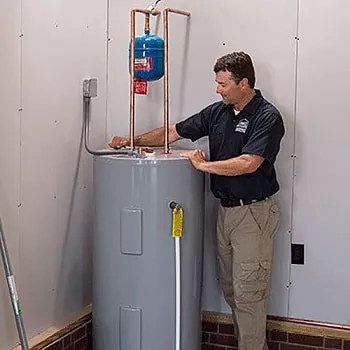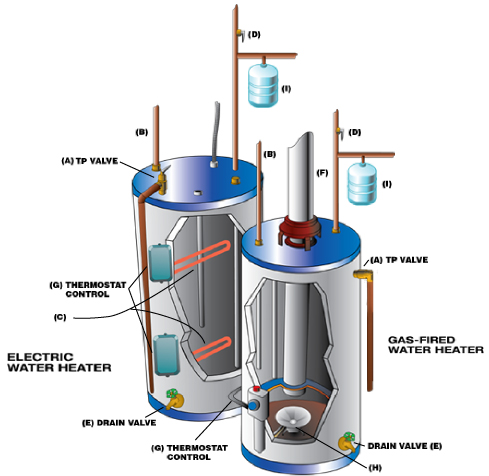Experienced water heater installation professionals serving Brea homes
Just How to Pick the Right Water Heating Unit Installation for Your Home
Picking the ideal water heater installment for your home needs a thorough understanding of various factors, including your home's certain hot water demands and the types of heaters available. Furthermore, considerations around energy efficiency and installation prices play an essential function in the decision-making procedure.

Assess Your Warm Water Demands
Evaluating your warm water needs is important for choosing a proper water heating system that successfully fulfills your household demands. To begin, take into consideration the number of residents in your home and their daily regimens, as these variables considerably influence warm water usage. Bigger families normally need higher hot water capacity for activities such as showers, washing, and dishwashing.
Recognize when your home requires the most hot water concurrently. Additionally, take into consideration the particular devices and fixtures that consume hot water, consisting of cleaning taps, dishwashing machines, and devices.
It is additionally vital to represent any future modifications in your house, such as added member of the family or changes in way of life that may enhance warm water demand. Last but not least, evaluate the power performance of potential water heating unit alternatives, as this can considerably affect lasting operating expenses. By thoroughly reviewing these aspects, you can make an enlightened choice that lines up with your warm water requirements and promotes reliable power usage in your house.
Check Out Various Hot Water Heater Types
When checking out various hot water heater kinds, it's essential to recognize the numerous alternatives readily available and their special attributes. One of the most usual types consist of storage tank water heaters, tankless hot water heater, warmth pump water heating systems, and solar water heaters.
Storage tank hot water heater are conventional systems that save a details volume of warm water, making them suitable for households with regular need. Nonetheless, they can lack hot water during height usage.
Tankless water heating systems, on the other hand, warm water on demand, supplying a countless supply. They are optimal for smaller sized areas and can be extra energy-efficient, but may call for a higher upfront investment.
Heatpump water heaters utilize electrical energy to move warm from the air or ground, making them efficient options in modest environments. They can be much more complicated to mount and may require additional area.
Last but not least, solar hot water heater harness sunlight to warm water, using an environmentally friendly alternative. They call for a considerable initial financial investment and hinge on warm problems but can substantially reduce utility expenses in time.
Each kind has distinctive benefits and considerations, making it critical to evaluate which finest fits your home's requirements and choices.
Take Into Consideration Power Performance Rankings
Understanding the various kinds of hot water heater normally causes the consideration of their energy effectiveness scores. Power efficiency is an essential consider selecting a hot water heater, as it directly impacts your energy expenses and the ecological impact of your home. Hot water heater are commonly ranked utilizing the Power Factor (EF) or the more recent Attire Energy Factor (UEF) metrics, which measure their performance by gauging the energy consumed versus the warm water generated.

It is also vital to examine the Energy Star accreditation, which represents that a hot water heater satisfies rigorous effectiveness criteria. Choosing a hot water heater with a high energy efficiency score can not only reduce your energy prices yet also enhance the general comfort of your home, making it an important element of the decision-making procedure.
Evaluate Setup Prices
Reviewing setup costs is a critical step in the selection procedure for a hot water heater, as it includes not just the price of the system itself but additionally the expenses associated with its setup. It is vital to obtain comprehensive quotes from multiple specialists to guarantee an extensive understanding of prospective prices. This includes labor costs, any kind of essential licenses, and materials required for the installment.
When examining setup costs, consider the complexity of the setup procedure. Factors such as the place of the hot water heater, existing plumbing framework, and whether the setup involves changing an old unit or installing a new system can considerably influence overall expenditures. As an example, retrofitting an existing area might sustain extra prices contrasted to a straightforward installment.
Furthermore, bear in mind the long-lasting effects of installment expenses. Some hot water heater might have greater ahead of time installment costs but provide higher power efficiency, resulting in cost savings on power costs over time. Inevitably, an extensive examination of setup costs, incorporated with an understanding of the unit's long-term efficiency, will certainly assist you in making an educated choice that straightens with site here your budget plan and requirements.
Review Maintenance Demands
Normal maintenance is essential for making sure the durability and effectiveness of a water heater. This procedure generally involves regular examinations, cleansing, and needed changes to keep the unit in ideal functioning problem. Property owners should set up yearly expert maintenance, which consists of inspecting the anode pole, flushing the tank to eliminate sediment build-up, and checking the pressure safety valve.
For tankless water heating units, upkeep concentrates on descaling the system to protect against mineral buildup, particularly in locations with difficult water. additional resources Additionally, it is essential to inspect and clean filters regularly to maintain proper water circulation.
House owners must additionally perform regular visual examinations, looking for indicators of leakages, deterioration, or uncommon sounds, which might show underlying problems. water heater installation Brea. Frequently evaluating the temperature level and stress relief valve is additionally crucial, as a malfunctioning shutoff can result in unsafe stress build-up
Lastly, following the supplier's specific maintenance guidelines is vital. These guidelines commonly consist of advised upkeep intervals and particular tasks to ensure the system operates successfully and securely. By adhering to appropriate upkeep procedures, property owners can prolong their water heating unit's lifespan and boost its performance, inevitably minimizing power prices and decreasing the probability of expensive fixings.
Conclusion
Choosing the proper water heating system installation necessitates a detailed evaluation of household hot water needs, the evaluation of different sorts of hot water heater, and consideration of power efficiency scores. In addition, an analysis of installation costs and maintenance commitments is vital for making sure ideal performance and long life. By sticking to these guidelines, home owners can make enlightened decisions that not only satisfy prompt demands yet likewise advertise long-term power performance and cost-effectiveness in water heating solutions.
Picking the proper water heating system setup for your home requires a comprehensive understanding of different elements, including your home's specific warm water demands and the types of heating units offered.Examining your warm water needs is vital for picking an appropriate water heating unit that efficiently satisfies your home demands. Water heating units are typically ranked using the Power Element (EF) or the more recent Uniform Power Variable (UEF) metrics, which quantify their effectiveness by gauging the energy taken in versus the hot water produced.
Some water heating systems may have higher in advance installment expenses however supply greater energy effectiveness, leading to cost savings try these out on energy bills over time. water heater installation.Choosing the proper water heating unit installment requires a thorough assessment of family warm water demands, the evaluation of numerous kinds of water heating systems, and consideration of energy efficiency scores